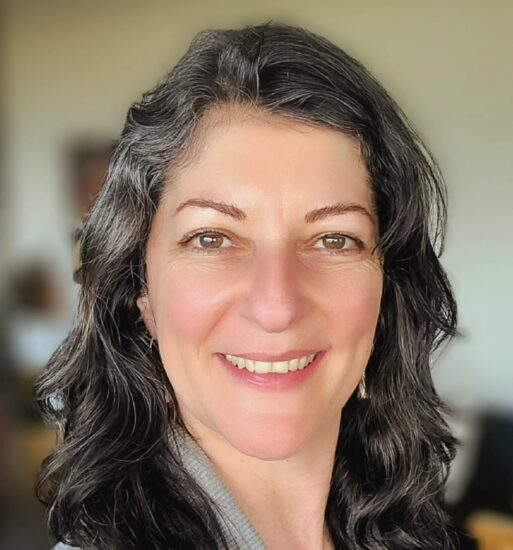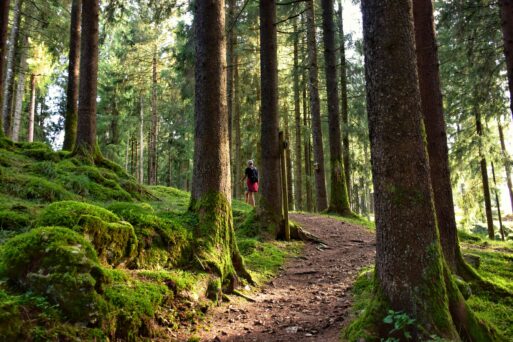
The slow, structured practice of forest bathing helps those grieving from loss receive the therapeutic benefits of nature.
Credit: Johannes Plenio
A hike through the woods is soothing for a grieving heart, but the practice of “forest bathing” can raise the therapeutic benefits to another level.
Japanese doctors began prescribing forest bathing, or Shinrin-yoku, back in the 1980s. It was their non-pharmaceutical antidote to the mounting stress of modern urban life. What distinguishes forest bathing from an ordinary walk down a wooded trail is a structured approach to deep mindfulness.
“It’s not hiking,” said Maria Verdicchio, a Certified Nature and Forest Therapy Guide in Vancouver Island, British Columbia, explaining that the destination is “here,” not “there.”

Maria Verdicchio, Certified Nature and Forest Therapy Guide
“You’re walking half a kilometer over 2.5 hours,” she said. “You’re moving very slowly.”
To help her clients find the proper pace and mindset, she likes to quote Vietnamese Thien Buddhist monk Thích Nhất Hạnh, known as the “father of mindfulness,” who said, “Walk as though your feet are kissing the earth.”
Finding that gentle pace, Verdicchio’s forest bathers are guided along following a carefully structured and sequenced journey.
“You’re being guided because it allows you to actually not think about where you’re going, what you’re doing, how you’re doing it,” Verdicchio said. In other words, she explained, unlike meditation where you consciously clear your mind, the flow of sensory input from the forest gently pushes rambling thoughts aside.
She offers guided “invitations” during the walk that encourage forest bathers to focus on specific elements in their surroundings. For instance, she may invite them to notice what’s in motion around them, such as tree branches bobbing in the wind, or the touch of the breeze on their skin, or the sounds of water and chirping birds.
 At the end of the walk, Verdicchio prepares tea for her forest bathers, and they have a chance to share their impressions. Most of them acknowledge that “they definitely feel different than when they started.”
At the end of the walk, Verdicchio prepares tea for her forest bathers, and they have a chance to share their impressions. Most of them acknowledge that “they definitely feel different than when they started.”
Forest Bathing Offers Multiple Benefits
According to scientific studies, the benefits of forest bathing include a decrease in stress hormones, such as cortisol. The practice also improves sleep quality, mood, and the ability to focus.
A Standford study in 2015 revealed why strolling through nature is particularly helpful for those grieving a loss. Brain scans of people who walked for 90 minutes in a natural area showed a decreased activity in the brain region associated with depression. The study also found reduced neural activity in the subgenual prefrontal cortex, a brain region active during rumination, which generates repetitive thoughts focused on negative emotions.
 In additional to the psychological benefits of forest bathing, the trees send some chemical love to anyone who enters the forest through the release of phytoncides. The U.S. Forest Service, which promotes forest bathing, states that these chemicals from natural oils not only lower blood pressure, anxiety and depression, but improve the human immune system by increasing natural killer cell activity.
In additional to the psychological benefits of forest bathing, the trees send some chemical love to anyone who enters the forest through the release of phytoncides. The U.S. Forest Service, which promotes forest bathing, states that these chemicals from natural oils not only lower blood pressure, anxiety and depression, but improve the human immune system by increasing natural killer cell activity.
There may be something else happening during forest bathing beyond what’s scientifically measurable. Indigenous people, as well as individuals with a unique appreciation for nature, have long sensed the nurturing, supportive energy radiating in a forest.
Famous primatologist and anthropologist Jane Goodall, who spent 60 years living in an African forest studying chimpanzees, summed it up well. She came to feel that the forest and all of nature was “one great whole, and that I was part of it too, and that I was in tune with a spiritual power that was all around.”
Or, as naturalist John Muir said of that power, “In every walk with nature, one receives far more than he seeks.”

 Forest Bathing Eases Grief by Soaking in Nature
Forest Bathing Eases Grief by Soaking in Nature


 Our Annual Seven Holiday Gifts for Someone Who Is Grieving, 2024 Edition
Our Annual Seven Holiday Gifts for Someone Who Is Grieving, 2024 Edition
 “Making Mobiles” by Karolina Merska
“Making Mobiles” by Karolina Merska
 “Hands Up to the Sky” by Michael Franti & Spearhead
“Hands Up to the Sky” by Michael Franti & Spearhead














